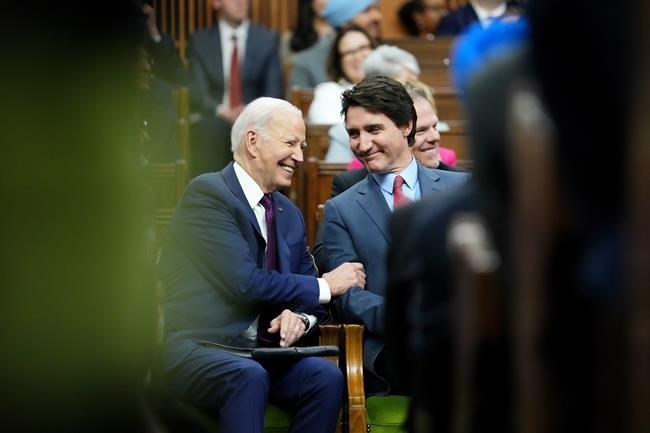- U.S. President Joe Biden’s visit to Canada was deemed a success, securing significant commitments from Canada, including a clear timeline for upgrading the North American Aerospace Defense Command (Norad) and progress on critical minerals.
- The closure of the Canada-U.S. border to northbound asylum seekers due to a “supplement” to a 2004 migration treaty was also a result of Biden’s visit.
- The visit also helped to address the U.S. perception that Canada represents a potential weak link in presenting a united foreign-policy front to China.
U.S. President Joe Biden’s visit to Ottawa has been hailed as an “overarching success” by Washington’s envoy, U.S. Ambassador David Cohen. In an expert panel discussion, Stephen Farnsworth and Colin Robertson shared their insights on Biden’s trip to Canada.
Clear Timeline on Upgrading Norad
During the discussions, Biden secured several significant commitments from Canada, including a clear timeline for upgrading the North American Aerospace Defense Command (Norad). Cohen noted that while there was no contention over the lingering issue of ongoing discussion, there were concerns over the timing of some of the commitments and the number of funds involved.
The commitments included a $7 billion plan to upgrade Norad, which will include new over-the-horizon radar systems within the next five years, along with other upgrades that will be completed in time for Canada to welcome its new F-35 fighters. Cohen noted that for the first time, there is a clear date attached to the operability of at least the first of these upgrades, which Norad had been looking for.
Progress on Critical Minerals and Aligned Views on China
Biden also made progress on critical minerals, which are essential elements in the manufacture of electric vehicles, semiconductors, and modern-day weaponry. The U.S. President noted that Canada has the critical minerals that the United States lacks, and as such, Canadian participation in the critical minerals supply chain and value chains is a given.
Cohen emphasized that there were tremendous complementary strengths and opportunities in the critical mineral space between Canada and the United States, as exemplified by the agreement with IBM to expand a semiconductor assembly and testing facility in Quebec, creating a corridor between Canada and upstate New York that will involve “every element” of the semiconductor supply chain.
China’s Aggressiveness in the Arctic
Cohen noted that discussions about upgrading Norad were likely helped by a recent incident involving a Chinese surveillance balloon drifting through North American airspace. He believes that the encounters focused everyone’s attention on China’s aggressiveness in the Arctic, reinforcing the need for both Canada and the United States to pay special attention to continental defense.
The Issue of Asylum Seekers and Irregular Migration
One of the most immediate effects of Biden’s visit was the closure of the Canada-U.S. border to northbound asylum seekers due to a “supplement” to a 2004 migration treaty between the two countries. Media reports noted a mad scramble by migrants to get into Canada via the busy unofficial crossing at Roxham Road before Friday night’s midnight deadline, as well as scores of would-be asylum claimants being turned away in the hours after the new agreement took effect.
According to Cohen, this is part of a broader U.S. vision that aims to address the much larger issue of irregular migration across the continent and around the world. He noted that the work done on the southern border has already had a dramatic impact over the past couple of months, and they hope to see a similar effect on the northern border.
Blunting a Perception of a Weak Link in Presenting a United Front to China
Biden’s visit also helped to blunt the U.S. perception that Canada represents a potential weak link in presenting a united foreign-policy front to China. Cohen noted that there had been concerns during confirmation hearings in 2021 regarding Canada’s traditionally more friendly relationship with China than the United States. However, those were more the views of the members of the Senate Foreign Relations Committee who were conducting the hearings, and these days, the two countries appear to be working from the same playbook.
Conclusion
President Joe Biden’s visit to Canada was deemed an “overarching success” by U.S. Ambassador David Cohen. The trip resulted in several significant commitments from Canada, including a clear timeline for upgrading the North American Aerospace Defense Command (Norad) and progress on critical minerals. Biden’s visit also helped to address concerns that Canada represents a potential weak link in presenting a united foreign-policy front to China. However, one immediate effect of Biden’s visit was the closure of the Canada-U.S. border to northbound asylum seekers due to a supplement to a 2004 migration treaty between the two countries.












